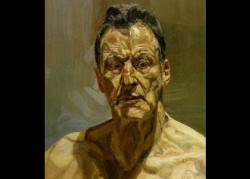I believe that its not just because he is the grandson of the founder of modern psychology that his work is soaked with existential expression, despite being undeniable that drama runs in his blood. It was almost an analysis session for him to paint his sitters, he liked to talk to them and get to know about their passing lives. The long hours they spent in his studio were so he could see deeper and deeper into their souls. David Hockney’s small portrait, for example, took 130 sitting hours. All his sitters are stripped bear of their masks, even the ones that did not pose nude. His friend Harry Diamond seated for him fully dressed and stated: if someone is interested in getting your essence down on canvas, they are also drawing your essence out of you. Most of his sitters are looking the other way, not right at the viewer, for me that is a sign of his talent to express personal feelings without appealing to the eyes, which is the most common and easiest way into a persons soul. The exhibition has a very illustrative chronological display as a narrative for the development of his art. We can see the evolution of his painting techniques and tools and be assured that he was bound to be the one modern painter of the self as it is inside. As Rembrandt, one of his masters, was for the seventeenth century. In Freud’s portraits the flesh seems real, maybe that is why he was considered a realist. The forms take an autonomy for themselves, even though they cant be separated from the content that is the existential condition of that being. Animals and people receive the same treatment as everyday objects, all have the same aural and trembling aspect that gives life to his subjects. As Lucian said: art is about the life of forms. In his paintings the tension between material and immaterial is clearly present. Flesh is material, but his paintings show the spirit, the soul. He kept evolving and experimenting with psychology and paint up to the end of his life in 2011.
Lucian Freud at the National Portrait Gallery – London



